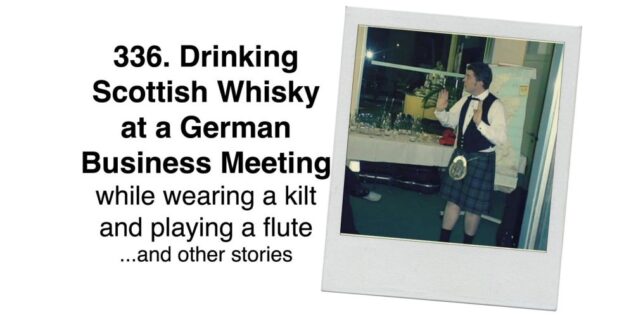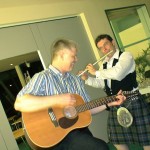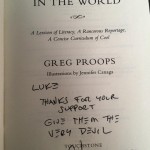Today on the podcast I’m talking to Ian Moore, who is a professional stand up comedian, published author and mod from London. Ian is probably the best dressed man ever to appear on this podcast. He is also a professional talker with many things to say.
![]() [DOWNLOAD]
[DOWNLOAD]
Photo: Richard Wood @comictog https://twitter.com/comictog
Intro before the intro
Hello listeners, this episode of Luke’s English Podcast is sponsored by italki which is a really convenient way to develop your fluency in English by talking to native speakers online – to claim your voucher worth 100ITC just go to http://www.teacherluke.co.uk/talk or click an italki logo on my website.
This episode features a conversation with English writer and comedian Ian Moore and in this part we talk mainly about mod, which is a British subculture involving clothing and music, but before the interview there is about a 15 minute introduction in which I explain a few things that will help you to fully understand the conversation. This podcast is for learners of English so sometimes it is necessary to give support to my listeners in advance of hearing a natural conversation in order to help them understand it all. My 15 minute intro to this episode is mainly an overview of the history of mod culture, with a few other short explanations. If you want to skip the intro, just move forwards by about 15 minutes and you can jump straight to the conversation. However, the introduction is there to help you to understand the cultural references, some history and other details in our conversation. OK, so that’s my intro before the intro, and now that this intro is nearly finished, I’ll let you listen to the other main intro which is going to come after this intro when this intro is finished, which is now so here is the proper intro, after the jingle, which is going to start as soon as I stop talking which is right about now.
Introduction and Explaining (Skip forwards 15 mins if you don’t want some explanations)
Today on the podcast I’m talking to Ian Moore, who is a professional stand-up comedian, published author and mod from London. Ian is probably the best dressed man ever to appear on this podcast. He is also a professional talker with many things to say.
I first met Ian a few months ago. He was in Paris for a few days and was the headline act at a comedy show where I was also performing. We got talking and our conversation was suitably rambling for me to consider Ian a good guest for this podcast. Also, there are some specific things I wanted to ask Ian, which I thought might be interesting for you my audience to hear.
Mod Culture
First, Ian is a mod. He’s a proper full-time mod. He dresses in all the correct mod clothing and has done for years. That might not mean anything to you and in fact that’s one of the reasons I wanted Ian to talk about it in this episode. Mod culture is quintessentially English. Basically, Mod is a fashion style, a way of life and a whole subculture of its own, and it’s uniquely English I think. Mod is one of the first genuine youth subcultures of the modern era. Nowadays there are many many subcultures (e.g. punk, skinhead, hippy, raver, indie kid, rocker, metal head, skater, etc) to the point that they don’t really mean anything, but back in the late 1950s and early 1960s there weren’t many youth subcultures. Everyone basically dressed the same except between different social classes in society. Certainly young people just dressed and acted like adults. Then in the postwar period young people became more independent and developed their own alternative cultures which were separate from mainstream lifestyles. Young people began to associate themselves with these alternative cultural movements as an expression of their individuality particularly in the form of the clothes they wore and the music they listened to.
Mod culture first became well-known in the UK as a result of a story in the newspapers about rival gangs of ‘mods’ and ‘rockers’ fighting each other on the beach in Brighton in 1964. These were the two main youth subcultures of the time and they hated each other. The rockers wore leather jackets, had their hair quite long and unclean, and rode motorbikes. They listened to rock and roll music. The mods were very sharply dressed in well fitted suits and ties, wore smart leather shoes, had a particular haircut (a bit like the Beatle cut) and rode Italian scooters. They listened to modern jazz, black American rhythm and blues or Jamaican ska. Their rivalry came to a head in the well-documented fighting that happened on the beaches in Brighton. The fight between the mods and the rockers was all over the newspapers and it shocked everyone, causing a kind of moral panic about young people. At that time it was the equivalent of something like the London riots of 2011. Most people couldn’t understand the violence and it was considered a sign of the breakdown of society. It was also the first time that most people became aware of the mod movement.
Since then, Mod has drifted in and out of fashion, going away in the early 70s when it was replaced by things like glam, soul boy and skinhead movements to be revived again at the end of the decade, in the 1980s and again in the 1990s. Being a mod is a way of life and it revolves mostly around the clothing you wear and the music you listen to, but there is a certain philosophy which underpins the movement too and that seems to be based on certain kinds of European existentialist thinking and a kind of open-mindedness to outside influences combined with a great attention to detail in clothing choices. In order to identify a mod, you need to be aware of the right details in the person’s clothing. A certain type of suit, cut in a specific way. Certain brands, types of shoe or coat, and a particular hair cut. The most famous mods are probably people like the musician Paul Weller of The Jam, the groups The Small Faces and The Who (early period), and these days the actor Martin Freeman who likes to wear mod clothing when he’s not acting in a movie or TV show.
While mod culture borrows from many other cultures it is very specifically British and therefore I think it is worth exploring on this podcast.
So, first – Ian is a mod. Secondly, he lives abroad – specifically on a farm in rural France, despite being a very well-dressed city boy from London, and he has lots of stories to tell about this, which form the basis of several books which he has written and which have been published. Both books tell funny true stories of his life as a mod living on a farm in the French countryside, they’re well-reviewed on Amazon and are definitely well-worth a read. They’re amusing, not challenging to read and are full of very entertaining little anecdotes and tales of his double life as a comedian working in London and a farmer in the French countryside. I thought it would be interesting to hear him talk about that on the podcast, and if you’re looking for appropriate books to read in English – I really recommend these ones. There are also audiobook versions read by Ian himself. The first book is called A la Mod, and the second is called C’est Modnifique.
And thirdly, Ian is a professional stand-up comedian – in fact The Guardian newspaper describe him as “One of the country’s top comedians”, which may account for why he’s able to write such funny stories in his books. Ian has been performing in the UK professionally for about 20 years and has travelled all around the country doing big gigs everywhere, including at London’s best venue The Comedy Store in Leicester Square. Ian has also performed in many locations around the world, so naturally I wanted to find out about that too.
So all in all, Ian Moore is a great guest for this podcast and we had a very enjoyable rambling conversation upstairs on my terrace on a very sunny morning this week. This is going to be two episodes, because we talked for over an hour together.
This might be a tricky episode for you to follow because our conversation includes quite a lot of tangents and references to things you might not be familiar with, so let me just give you an overview of the main things you’ll hear.
At the start we talk about the view from my terrace, including the Sacre Coeur basilica, which we can see.
Then we talk about how he met his wife on the steps of the Sacre Coeur when he first moved to France. Then we go on to chat about his first experiences in France and why he fell in love with the country. (He talks about buying a vinyl copy of “Complete Madness” in a supermarket in Nice – Madness are a band which has a large mod and skinhead following).
Then we talk about where Ian comes from, and how he describes his accent. (Basically, he’s got a typical south east / London accent, cockney or ‘mockney’ even though as a child he used to live up north in Blackburn and also in the east in Norfolk. He spent most of his time in London.)
We discuss his level of French, and then move on to talk about being a mod and what that means, including quite a lot of specific descriptions of his clothing and mod style in general, so watch out for some vocabulary to describe clothing in this episode.
But now, without any further ado, let’s join the conversation with Ian Moore and you will first hear us talking about the views of Paris which we can see from my terrace.
*CONVERSATION BEGINS*
We talk mainly about mod culture. The podcast pauses after about 40 minutes.
*CONVERSATION PAUSES*
So, that’s the end of part one of this conversation, in which we mainly covered mod culture. Check out the page for this episode where you’ll find some videos of mod-related things and also some stand-up footage of Ian Moore on stage.
How was that for you? Did you manage to understand what we were saying? I expect it might be a bit tough because we’re talking about things that you might never have heard about before. THat’s one of the main reasons why it’s hard to understand native speakers sometimes. It might be because of the pronunciation – specifically connected speech and the way some sounds are not fully pronounced, it might be the vocabulary being used, but also it’s because of the cultural references being made and the general mindset of the conversation. These are all factors that influence your ability to understand native speakers. Certainly the cultural aspect is very important. If you’re on the same wavelength as the people you’re listening to, or talking to, it makes it far more likely that you’ll understand them. This will help you work out the meaning of words that you don’t know and fill in the words that you didn’t hear. You have to try to tune in to not just the language, but the way of thinking of the people talking and then you’ll understand more and ultimately pick up more of the English yourself. So, listening to conversations like this is vital, even if it’s difficult.
Don’t forget that you also have to activate the English you hear in the podcast by having similar conversations yourselves, perhaps with a language partner on italki. Don’t forget to take advantage of my italki offer by visiting www.teacherluke.co.uk/talk
OK, part 2 of this episode will be available soon and then you can hear Ian talking about his funny experiences of being a mod in the French countryside, dealing with animals of all shapes and sizes, the challenges of living on a farm and the life of a professional stand up comedian. Thanks for listening to this episode, I look forward to reading comments on the website. Have a great day, morning, afternoon, evening or night and I’ll speak to you soon.
Bye.
Luke
Mod culture
Ian Moore on stage















 italki
italki










